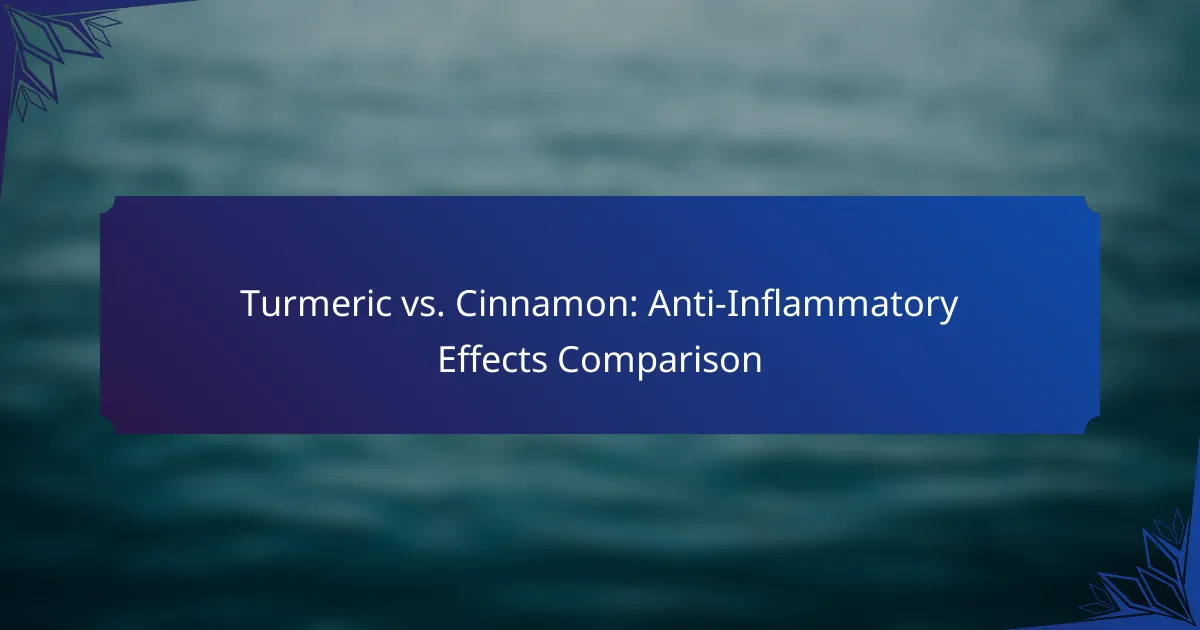Turmeric and cinnamon are both celebrated for their anti-inflammatory properties, yet they operate through distinct mechanisms and exhibit different levels of effectiveness. Turmeric’s active compound, curcumin, is particularly recognized for its strong ability to reduce inflammation, making it a powerful ally against various inflammatory conditions. In contrast, cinnamon also contributes to anti-inflammatory responses, supporting overall health through its unique compounds.

What are the anti-inflammatory effects of turmeric?
Turmeric is known for its anti-inflammatory effects primarily due to its active compound, curcumin. This natural substance helps reduce inflammation in the body, which can alleviate symptoms of various inflammatory conditions.
Curcumin as the active compound
Curcumin is the principal bioactive compound in turmeric, responsible for its vibrant yellow color and health benefits. It works by inhibiting various molecules that play a role in inflammation, such as cytokines and enzymes. This makes curcumin a potent anti-inflammatory agent.
Its bioavailability can be low, meaning that the body does not absorb it efficiently. To enhance absorption, it is often recommended to consume curcumin with black pepper, which contains piperine, a compound that can increase curcumin’s bioavailability significantly.
Research studies supporting efficacy
Numerous studies have demonstrated curcumin’s effectiveness in reducing inflammation. For instance, research has shown that curcumin can lower markers of inflammation in conditions like arthritis and inflammatory bowel disease. Some studies suggest that curcumin may be as effective as certain anti-inflammatory medications.
However, while many studies support its benefits, the quality and dosage of curcumin used can vary. It is essential to consider these factors when evaluating the results of research on turmeric and curcumin.
Recommended dosage for inflammation
The recommended dosage of curcumin for anti-inflammatory effects typically ranges from 500 mg to 2,000 mg per day, depending on the individual’s health status and the condition being treated. It is advisable to start with a lower dose and gradually increase it while monitoring for any side effects.
Consulting with a healthcare professional before starting curcumin supplements is crucial, especially for those on other medications or with underlying health issues. This ensures safety and effectiveness in managing inflammation.

What are the anti-inflammatory effects of cinnamon?
Cinnamon has notable anti-inflammatory effects primarily due to its active compounds, which can help reduce inflammation in the body. Regular consumption may support overall health by mitigating inflammatory responses linked to various chronic conditions.
Cinnamaldehyde as the active compound
Cinnamaldehyde is the primary active compound in cinnamon, responsible for its distinct flavor and many health benefits. This compound has been shown to inhibit the production of inflammatory markers, thereby reducing inflammation at the cellular level.
Studies suggest that cinnamaldehyde can modulate pathways involved in inflammation, making it a potential natural remedy for inflammatory diseases. Its antioxidant properties further enhance its ability to combat oxidative stress, which often accompanies inflammation.
Clinical evidence for anti-inflammatory properties
Research indicates that cinnamon may help lower markers of inflammation, such as C-reactive protein (CRP) and interleukin-6 (IL-6). Some clinical trials have shown that cinnamon supplementation can lead to significant reductions in these markers among participants with inflammatory conditions.
While more extensive studies are needed, existing evidence supports the use of cinnamon as a complementary approach to managing inflammation. It is often recommended alongside other lifestyle changes, such as diet and exercise, for optimal results.
Recommended dosage for inflammation
The typical recommended dosage of cinnamon for anti-inflammatory effects ranges from 1 to 6 grams per day, depending on individual health needs and tolerance. It’s advisable to start with lower amounts and gradually increase as needed.
When using cinnamon supplements, consult with a healthcare provider to ensure safety and efficacy, especially if you are taking medications or have underlying health conditions. Incorporating cinnamon into daily meals, such as in smoothies or oatmeal, can also provide its benefits naturally.

How do turmeric and cinnamon compare in anti-inflammatory effects?
Turmeric and cinnamon both exhibit anti-inflammatory properties, but they work through different mechanisms and have varying levels of effectiveness. Turmeric, primarily due to its active compound curcumin, is often regarded as more potent in reducing inflammation compared to cinnamon.
Effectiveness comparison
Turmeric is widely recognized for its strong anti-inflammatory effects, largely attributed to curcumin, which has been shown to inhibit several inflammatory pathways. Studies suggest that curcumin can reduce markers of inflammation by a significant margin, often cited in the context of chronic conditions like arthritis.
Cinnamon, while beneficial, tends to have milder anti-inflammatory effects. Its active compounds, such as cinnamaldehyde, can help reduce inflammation but are generally less potent than curcumin. For those looking for a stronger anti-inflammatory agent, turmeric may be the better choice.
Synergistic effects when combined
Combining turmeric and cinnamon may enhance their overall anti-inflammatory benefits. The unique compounds in each spice can work together to provide a broader spectrum of health benefits, potentially improving the effectiveness of both.
For example, using turmeric in a dish that includes cinnamon could not only add flavor but also amplify the anti-inflammatory properties, making it a practical approach for those seeking natural remedies. Consider incorporating both spices into smoothies, teas, or curries for maximum effect.
Side effects and safety profiles
Turmeric is generally safe for most people when used in culinary amounts, but high doses or supplements may cause gastrointestinal issues or interact with certain medications, such as blood thinners. It’s advisable to consult a healthcare professional before starting high-dose curcumin supplements.
Cinnamon is also safe in moderate amounts, but excessive consumption, particularly of cassia cinnamon, can lead to toxicity due to high coumarin levels. Stick to Ceylon cinnamon for a safer option and limit intake to a few grams per day to avoid potential side effects.

What are the best supplements for turmeric and cinnamon?
The best supplements for turmeric and cinnamon typically contain high-quality extracts that maximize their anti-inflammatory properties. Look for products standardized to contain significant amounts of curcumin for turmeric and cinnamaldehyde for cinnamon.
Top turmeric supplements available
Some of the leading turmeric supplements include those that feature curcumin extracts combined with black pepper extract (piperine) to enhance absorption. Popular options often come in capsule form, with dosages ranging from 500 mg to 1500 mg of curcumin per serving.
Brands like Gaia Herbs, Nature’s Way, and CurcuminRich are well-regarded for their quality and effectiveness. When selecting a turmeric supplement, check for third-party testing to ensure purity and potency.
Top cinnamon supplements available
For cinnamon supplements, look for those that use Ceylon cinnamon, which is considered safer and more beneficial than Cassia cinnamon. Common forms include capsules and powdered extracts, often providing around 500 mg to 1000 mg per serving.
Brands such as NOW Foods, Herbal Secrets, and Swanson offer reputable cinnamon supplements. As with turmeric, verify that the product has been tested for quality to ensure you are getting the intended health benefits.
Brand comparisons and reviews
When comparing turmeric and cinnamon supplements, consider factors like ingredient sourcing, extraction methods, and customer reviews. For turmeric, brands that combine curcumin with piperine tend to receive higher ratings for effectiveness.
In terms of cinnamon, products that specify the type of cinnamon used (Ceylon vs. Cassia) often garner better reviews due to safety and health benefits. Always read customer feedback to gauge real-world effectiveness and any potential side effects.

How to incorporate turmeric and cinnamon into your diet?
Incorporating turmeric and cinnamon into your diet can enhance flavor while providing anti-inflammatory benefits. Both spices can be easily added to various dishes, beverages, and snacks for a health boost.
Recipes featuring turmeric
Turmeric can be used in a variety of recipes, from savory to sweet. A popular option is turmeric tea, made by simmering fresh or ground turmeric with water, ginger, and a dash of honey. This drink not only tastes good but also offers potential health benefits.
Another way to enjoy turmeric is by adding it to smoothies. Combine a banana, spinach, almond milk, and a teaspoon of turmeric for a nutritious breakfast. You can also sprinkle turmeric on roasted vegetables or incorporate it into soups and stews for added flavor and color.
Recipes featuring cinnamon
Cinnamon is versatile and can enhance both sweet and savory dishes. A classic recipe is cinnamon oatmeal, where you simply add a teaspoon of ground cinnamon to your morning oats, along with fruits and nuts for extra nutrition. This dish is not only filling but also offers a warm, comforting flavor.
For a quick snack, try cinnamon-spiced apples. Slice apples and toss them with cinnamon and a bit of honey, then bake until tender. Additionally, cinnamon can be added to coffee or smoothies for a flavorful twist, making it a great option for daily consumption.
